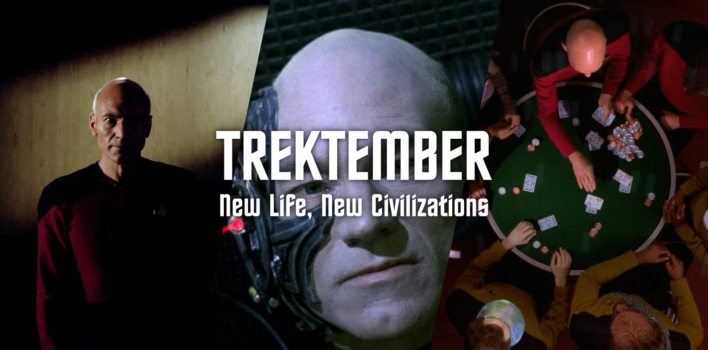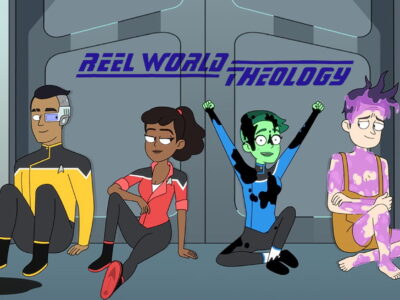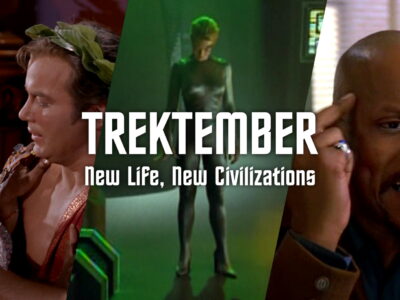From Farpoint to the Poker Table: Picard Walking in Fellowship
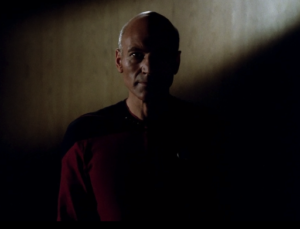 The very first time we meet Captain Jean-Luc Picard he is shrouded in darkness, peering out a window into the great unexplored mass of the galaxy. He is alone in the shadows, having just taken command of the Enterprise-D, and is readying for his first mission to Farpoint station. This darkness seems to follow him for much of his early missions aboard Starfleet’s flagship vessel. Picard is a downright sourpuss in the early seasons of The Next Generation.
The very first time we meet Captain Jean-Luc Picard he is shrouded in darkness, peering out a window into the great unexplored mass of the galaxy. He is alone in the shadows, having just taken command of the Enterprise-D, and is readying for his first mission to Farpoint station. This darkness seems to follow him for much of his early missions aboard Starfleet’s flagship vessel. Picard is a downright sourpuss in the early seasons of The Next Generation.
The very last time we see Captain Picard in the series, he is sitting at a poker table happily dealing cards to his crew for a game of five card stud. He is not alone, but among friends. The once hard-nosed leader with a storm cloud over his head is now a welcomed member of a community, a family. It is a significant change, and one that represents a central message of the Star Trek franchise.
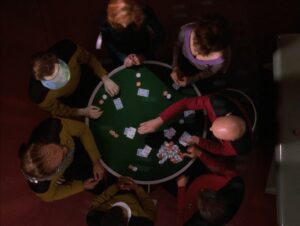 As creator Gene Roddenberry put it, “Star Trek was an attempt to say that humanity will reach maturity and wisdom on the day that it begins not just to tolerate, but take a special delight in differences in ideas and differences in life forms.” Picard’s journey from Farpoint to the community table is fueled by a growth in both understanding and championing the inherent value of new life and new civilizations. From the surliest Nausicaans to the diverse group of humanoids aboard his ship, he learns more and more how to empathize with them and lean on them when he needs it most. As we view his journey, we see a working example of how we can walk with God and others to live in gospel-centered community.
As creator Gene Roddenberry put it, “Star Trek was an attempt to say that humanity will reach maturity and wisdom on the day that it begins not just to tolerate, but take a special delight in differences in ideas and differences in life forms.” Picard’s journey from Farpoint to the community table is fueled by a growth in both understanding and championing the inherent value of new life and new civilizations. From the surliest Nausicaans to the diverse group of humanoids aboard his ship, he learns more and more how to empathize with them and lean on them when he needs it most. As we view his journey, we see a working example of how we can walk with God and others to live in gospel-centered community.
Leaning on the Crew
“They took everything I was…”
“…This is going to be with you a long time, Jean-Luc. A long time. You have to learn to live with it. You have a simple choice now. Live with it below the sea with Louis, or above the clouds with the Enterprise.”
—Jean-Luc and Robert Picard, “Family” (TNG S4E2)
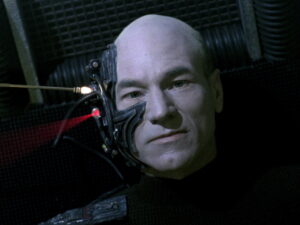 It’s hard to think of Picard and not think of his white whale—the Borg. Without doubt, one of the most pivotal moments in his life was his assimilation. It was a violating, deeply traumatic experience that robbed him of his identity. He would ultimately use this experience to aid others he encountered with similar trauma, but he could not have made that growth without help from his family and crew.
It’s hard to think of Picard and not think of his white whale—the Borg. Without doubt, one of the most pivotal moments in his life was his assimilation. It was a violating, deeply traumatic experience that robbed him of his identity. He would ultimately use this experience to aid others he encountered with similar trauma, but he could not have made that growth without help from his family and crew.
In the midst of the chaos of Picard’s assimilation, acting Captain Riker was forced to let go of Picard in order to defeat the Borg and save Earth. He threw out Picard’s rule book and instituted unorthodox leadership, but he made a key decision not to abandon the humanity of his friend. He and the crew then put their lives on the line to rescue Picard, which in turn provided the pathway for defeating the enemy.
The crew’s love and sacrifice for Picard saved his life and bonded them together as they never had been before. Afterwards, deep in his pain and humiliation, Picard wanted to stay resolute and rigid, going so far as to flirt with leaving Starfleet. Instead, with the help of his brother Robert, he came to realize he belonged with his crew.
Two are better than one, because they have a good reward for their toil. For if they fall, one will lift up his fellow. But woe to him who is alone when he falls and has not another to lift him up! Again, if two lie together, they keep warm, but how can one keep warm alone? And though a man might prevail against one who is alone, two will withstand him—a threefold cord is not quickly broken.
—Ecclesiastes 4:9-12
There are so many other instances where the crew must rely on each other throughout the series, and it provides a continual picture of the community we see in Ecclesiastes. The author of Ecclesiastes repeatedly warns of the vanity and fruitless toil of self-indulgence, but shows us that if two are together, one will lift up his fellow and they will not be as easily broken. The conquering hero Captain Picard, well experienced and decorated, still had to learn to lean on his crew when he fell. This is our calling as Christians—to dwell closely with our community so we can help each other in times of trouble.
Affirming the Worth of the Individual
The first time any man’s freedom is trodden on, we are all damaged.
—Jean-Luc Picard, “The Drumhead” (TNG S4E21)
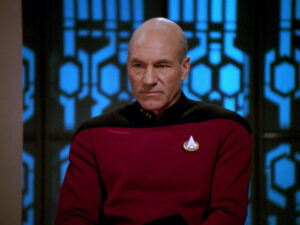 I think C.S. Lewis and Jean-Luc Picard would have hung out. I can just imagine the captain joining the Inklings for a pint and nodding along when Lewis said “there are no ordinary people. You have never met a mere mortal.” To be sure, he would have agreed, because Picard knew this truth to his core. Across the final frontier, Picard encountered infinite diversity in infinite combinations, as the Vulcans say. Shape shifting space dwellers, warrior races, even god-like beings like Q—he was uniquely aware of the eternal significance of every person.
I think C.S. Lewis and Jean-Luc Picard would have hung out. I can just imagine the captain joining the Inklings for a pint and nodding along when Lewis said “there are no ordinary people. You have never met a mere mortal.” To be sure, he would have agreed, because Picard knew this truth to his core. Across the final frontier, Picard encountered infinite diversity in infinite combinations, as the Vulcans say. Shape shifting space dwellers, warrior races, even god-like beings like Q—he was uniquely aware of the eternal significance of every person.
The most famous episode of Picard advocating for the worth of the individual might be “The Measure of a Man,” in which he defends the sentience and rights of Data. But a broader example is found in the episode “The Drumhead.” Here Picard must stop a witch hunt from consuming the ship with unjust accusations: he gives an impassioned speech (and I mean, he’s just the best at these things) on the rights and freedoms of all individuals, asking “have we become so fearful, have we become so cowardly that we must extinguish a man because he carries the blood of a current enemy?”
This echoes another great moment from the season two episode “The Schizoid Man,” in which a man forcefully transfers his consciousness into Data to cheat death. Picard ain’t about to let that happen either, saying: “No being is so important that he can usurp the rights of another.” He recognizes that no one is a mere mortal, and that we are all important. By defending the rights of the individual regardless of their bloodline or heritage, he knew that all would benefit.
And we urge you, brothers, admonish the idle, encourage the fainthearted, help the weak, be patient with them all. 15 See that no one repays anyone evil for evil, but always seek to do good to one another and to everyone.
—1 Thessalonians 5:14
Picard may have been drawn into community through his crew’s sacrifice for him during his assimilation (among other times), but one can only truly enter into community by believing that every person has value. After the trial of “The Drumhead,” Picard instructs Worf on how to move forward. “Vigilance, Mr. Worf,” he says. “That is the price we have to continue to pay.”
The church in Thessalonica had a strong faith, and the apostle Paul wrote to encourage them to remain vigilant in that faith. To do this, he implored them to remain at peace in their community, continuing to build one another up and do good to everyone. This is what the act of affirming the Imago Dei looks like. Seeing that all are made in God’s image drives us to bring about peace and unity. It may feel a little different if the individual has forehead ridges or tentacles instead of arms, but the practice remains the same. Picard lived this out, and it strengthened his community just as it will for ours if we do the same.
The Never-Ending Trial
You just don’t get it, do you, Jean-Luc? The trial never ends. We wanted to see if you had the ability to expand your mind and your horizons. And for one brief moment, you did…That is the exploration that awaits you. Not mapping stars and studying nebulae but charting the unknown possibilities of existence.
—Q, “All Good Things” (TNG S7E25)
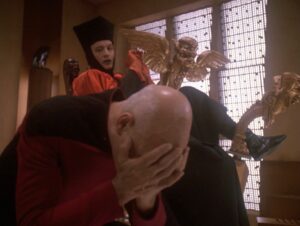 Imagine being put on trial for the whole of humanity, whisked away to a merciless courtroom and declared to be part of a “dangerous, savage, child race.” What would you do? Picard accepted the test levied at him by Q because he knew there was potential in his crew and mankind. He knew that there was goodness to be found and that together they could prove it.
Imagine being put on trial for the whole of humanity, whisked away to a merciless courtroom and declared to be part of a “dangerous, savage, child race.” What would you do? Picard accepted the test levied at him by Q because he knew there was potential in his crew and mankind. He knew that there was goodness to be found and that together they could prove it.
The trial didn’t end after the encounter at Farpoint station, of course. In fact, we find out in one of the absolute greatest TV series finales ever (I will accept no counter arguments!) that the trial of humanity never ended and would continue eternally. The question asked of the Enterprise crew is one we can ask ourselves- can we expand our minds and chart the possibilities of existence? We are certainly capable, but it so often feels like we are unwilling.
This is the message we have heard from him and proclaim to you, that God is light, and in him is no darkness at all. If we say we have fellowship with him while we walk in darkness, we lie and do not practice the truth. But if we walk in the light, as he is in the light, we have fellowship with one another, and the blood of Jesus his Son cleanses us from all sin.
—1 John 1:5-7
Your political affiliation does not matter. Your social status does not matter. Your possessions do not matter. The only thing that matters is walking in fellowship with God. Yet we stray so easily into the fruitless toil of our self-indulgence, prone to wander into darkness until we’re broken with no one beside us to pick us back up. To quote C.S. Lewis again, “we are far too easily pleased.” This not only harms us, but wounds those around us too.
Picard’s willingness to continually affirm the worth of the individual and walk in fellowship with others paints for us a picture of how we can explore the possibilities of existence. Rather than indulging in our own desires, never looking up from our toil, we are called to dwell in holy community. We are called to value life, aid those who are hurting, and bring about justice where there is none. Where we seek out new life is where we find Christ. When we champion the rights of others, we walk in His light, and leave the darkness far behind us.
There is such a beautiful moment at the very end of The Next Generation as Picard stares around the table at his crew, and they back at him. You can see that his heart is full as he realizes he was always welcome there. If we have fellowship with Christ, we are welcome at the table too. The gospel-centered community created from His light is the very thing that expands our horizons. It allows the weak to find strength and the last to be first. And from there, the sky’s the limit.


